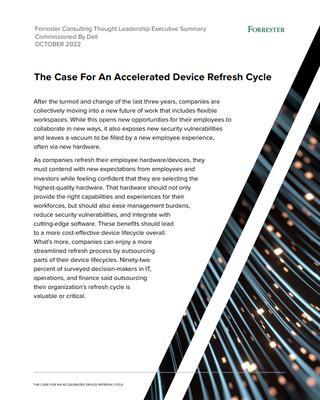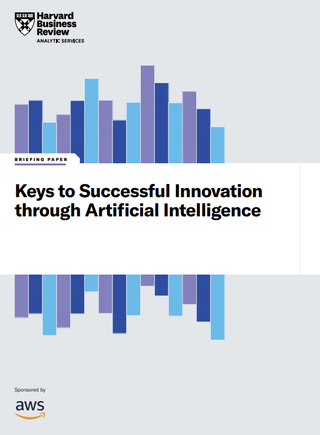Google’s latest warning over generative AI shows that ChatGPT has it cornered
With ground lost in the chatbot arms race, the impetus is now on Google to prove Bard is worth the wait

Microsoft and Google are both making the generative AI core to their search engine propositions, with each company having made major announcements to this effect in February. But, Google’s approach so far has been hasty, suggesting a lack of confidence in its ability to fend off ChatGPT - something that could hurt its reputation in the long run.
Microsoft had been rumoured to be negotiating significant funding for OpenAI since November and has since announced the full integration of ChatGPT into Bing search in a future update.
The firm reportedly went to the extreme lengths of upending the work of internal teams in December, reassigning departments to focus on a response to the newfound competition in ChatGPT. The result is Bard, which was reportedly pulled out of development and fast-tracked for a public reveal by Sundar Pichai.
Whether the public unveiling of Bard in February followed the original timeline of the product or was hastened by the rapid progress OpenAI was making with ChatGPT, is unknown.
What we do know is that the launch of Bard was sudden and unexpected - wider reports speculated a May release date - and it's something Google's top executives have since alluded to.
Alphabet chairman John Hennessy has stated that prior to the change in strategy, Google's position was that Bard was too immature a product for public demonstration.
“I think Google was hesitant to productise this because it didn’t think it was really ready for a product yet, but, I think, as a demonstration vehicle, it’s a great piece of technology,” Hennessy said at a venture capital summit, as reported by CNBC.
Get the ITPro. daily newsletter
Receive our latest news, industry updates, featured resources and more. Sign up today to receive our FREE report on AI cyber crime & security - newly updated for 2024.
OpenAI’s GPT-3 model had been thought ‘too dangerous’ for the public when first beta tested in 2020. The company spent the following years tweaking the model to nullify its tendency to produce hate speech.
It’s possible that Google has been putting out similar fires internally, and that Bard represents a marked improvement over previous models. But, a lack of public insight into this development cycle, as opposed to ChatGPT's controversial yet more transparent history, makes it difficult to benchmark Bard outside of its immediate accuracy.
Bard is only available to designated testers at the time of writing, but its cracks have famously already materialised.
Flaws in the system were telegraphed by Google itself, with the tool having provided false information on the James Webb Space Telescope in one of the announcement demos. Google’s stock plunged 7% in response, worth $100 billion (£83 billion) in market value.
If the market’s reaction seems overstated, it’s worth remembering that Google has spent over a decade as an industry leader in AI.
With its acquisition of Deepmind and the development of LaMDA and TensorFlow, for years the firm has made efforts to rebrand itself as an AI company first and foremost.
It’s significant, then, that in a showdown with the Microsoft-backed ChatGPT, Google has been the first to blink and seemingly exposed its own tech as substandard. For all its talk of taking time to perfect the system, reports stated that Google felt pushed to rush development to get the system into shape in time for the reveal.
As with all cutting-edge technology, there will always be one vendor that wins the race to launch. OpenAI won this round. However, Google's delay in realising the potential for generative AI, forced to scramble hurriedly as ChatGPT soared in popularity, potentially shows how difficult it was to predict that the technology would take off as it has done in the past three months. So much so that not even one of the world's AI powerhouses could do it.
Alternatively, it may indicate a lack of foresight within Google's ranks, raising questions about why its potential wasn't realised sooner.
In January, an NYT report stated that Google “will ‘recalibrate’ the level of risk it is willing to take when releasing the technology", prompting OpenAI CEO Sam Altman to claim on Twitter that Google is increasing its risk, and that OpenAI will not do the same.
In this sense, Google has suffered a double defeat at this important juncture in the history of AI.
Forced to sideline its own safety principles in order to outflank Microsoft, its prize has been to publicly display a product that doesn’t meet its own quality standards. In response to the criticism, senior figures in the company have sought to muddy the waters of discussion around generative AI entirely.
"This kind of artificial intelligence we're talking about right now can sometimes lead to something we call hallucination," Prabhakar Raghavan, senior vice president at Google and head of Google Search, told Welt am Sonntag.
"This then expresses itself in such a way that a machine provides a convincing but completely made-up answer.”

The case for an accelerated device refresh cycle
Achieving a more cost-effective device lifecycle overall
Google took a seat at the table attempting to sell its own alternative to ChatGPT. It’s now presenting a version of events in which both it and OpenAI are fighting against the common enemy of “hallucination”.
In backpedalling to this degree, Google has shown its weaker hand and will need to demonstrate measurable improvement in Bard to reinspire confidence in the future.
There is still a long way to go for both of these products, and Google has bet on its strong user base as a foundation to maintain its search engine dominance. This could put it in good stead over OpenAI, which despite Microsoft’s funds has been forced to launch a paid tier of ChatGPT in order to meet rising costs and server demand.
Neither Google nor Microsoft has set out firm general release dates for their respective AI upgrades. But, in setting the pace so far, Microsoft has hammered a significant dent in Google’s long-maintained title as the leading AI firm in the industry.

Rory Bathgate is Features and Multimedia Editor at ITPro, overseeing all in-depth content and case studies. He can also be found co-hosting the ITPro Podcast with Jane McCallion, swapping a keyboard for a microphone to discuss the latest learnings with thought leaders from across the tech sector.
In his free time, Rory enjoys photography, video editing, and good science fiction. After graduating from the University of Kent with a BA in English and American Literature, Rory undertook an MA in Eighteenth-Century Studies at King’s College London. He joined ITPro in 2022 as a graduate, following four years in student journalism. You can contact Rory at rory.bathgate@futurenet.com or on LinkedIn.





